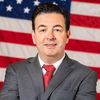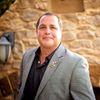Darren Hamilton (Texas)
Darren Hamilton (Libertarian Party) is running for election to the Texas House of Representatives to represent District 57. He is running in the Libertarian Party convention on March 14, 2026.[source]
Biography
Darren Hamilton was born in Spokane, Washington. Hamilton's professional experience includes working in data management. He has been an actor, radio personality, motivational speaker, and club DJ. Hamilton served in the U.S. Marine Corps from 1984 to 1992.[1]
Elections
2026
See also: Texas House of Representatives elections, 2026
General election
The primary will occur on March 14, 2026. The general election will occur on November 3, 2026. General election candidates will be added here following the primary.
The candidate list in this election may not be complete.
Democratic primary
The candidate list in this election may not be complete.
Democratic primary for Texas House of Representatives District 57
Ray Stith (D) is running in the Democratic primary for Texas House of Representatives District 57 on March 3, 2026.
Candidate | ||
 | Ray Stith | |
 = candidate completed the Ballotpedia Candidate Connection survey. = candidate completed the Ballotpedia Candidate Connection survey. | ||||
| If you are a candidate and would like to tell readers and voters more about why they should vote for you, complete the Ballotpedia Candidate Connection Survey. | ||||
Do you want a spreadsheet of this type of data? Contact our sales team. | ||||
Republican primary
The candidate list in this election may not be complete.
Republican primary for Texas House of Representatives District 57
Incumbent Richard Hayes (R) is running in the Republican primary for Texas House of Representatives District 57 on March 3, 2026.
Candidate | ||
 | Richard Hayes | |
 = candidate completed the Ballotpedia Candidate Connection survey. = candidate completed the Ballotpedia Candidate Connection survey. | ||||
| If you are a candidate and would like to tell readers and voters more about why they should vote for you, complete the Ballotpedia Candidate Connection Survey. | ||||
Do you want a spreadsheet of this type of data? Contact our sales team. | ||||
Libertarian Party convention
The candidate list in this election may not be complete.
Libertarian convention for Texas House of Representatives District 57
Darren Hamilton (L) is running in the Libertarian Party convention for Texas House of Representatives District 57 on March 14, 2026.
Candidate | ||
 | Darren Hamilton | |
 = candidate completed the Ballotpedia Candidate Connection survey. = candidate completed the Ballotpedia Candidate Connection survey. | ||||
| If you are a candidate and would like to tell readers and voters more about why they should vote for you, complete the Ballotpedia Candidate Connection Survey. | ||||
Do you want a spreadsheet of this type of data? Contact our sales team. | ||||
Endorsements
Ballotpedia is gathering information about candidate endorsements. To send us an endorsement, click here.
2024
See also: Texas House of Representatives elections, 2024
General election
General election for Texas House of Representatives District 57
Incumbent Richard Hayes defeated Collin Johnson and Darren Hamilton in the general election for Texas House of Representatives District 57 on November 5, 2024.
Candidate | % | Votes | ||
| ✔ |  | Richard Hayes (R) | 58.3 | 51,865 |
 | Collin Johnson (D)  | 38.5 | 34,279 | |
 | Darren Hamilton (L)  | 3.2 | 2,870 | |
| Total votes: 89,014 | ||||
 = candidate completed the Ballotpedia Candidate Connection survey. = candidate completed the Ballotpedia Candidate Connection survey. | ||||
| If you are a candidate and would like to tell readers and voters more about why they should vote for you, complete the Ballotpedia Candidate Connection Survey. | ||||
Do you want a spreadsheet of this type of data? Contact our sales team. | ||||
Democratic primary election
Democratic primary for Texas House of Representatives District 57
Collin Johnson advanced from the Democratic primary for Texas House of Representatives District 57 on March 5, 2024.
Candidate | % | Votes | ||
| ✔ |  | Collin Johnson  | 100.0 | 4,421 |
| Total votes: 4,421 | ||||
 = candidate completed the Ballotpedia Candidate Connection survey. = candidate completed the Ballotpedia Candidate Connection survey. | ||||
| If you are a candidate and would like to tell readers and voters more about why they should vote for you, complete the Ballotpedia Candidate Connection Survey. | ||||
Do you want a spreadsheet of this type of data? Contact our sales team. | ||||
Republican primary election
Republican primary for Texas House of Representatives District 57
Incumbent Richard Hayes advanced from the Republican primary for Texas House of Representatives District 57 on March 5, 2024.
Candidate | % | Votes | ||
| ✔ |  | Richard Hayes | 100.0 | 13,553 |
| Total votes: 13,553 | ||||
 = candidate completed the Ballotpedia Candidate Connection survey. = candidate completed the Ballotpedia Candidate Connection survey. | ||||
| If you are a candidate and would like to tell readers and voters more about why they should vote for you, complete the Ballotpedia Candidate Connection Survey. | ||||
Do you want a spreadsheet of this type of data? Contact our sales team. | ||||
Libertarian convention
Libertarian convention for Texas House of Representatives District 57
Darren Hamilton advanced from the Libertarian convention for Texas House of Representatives District 57 on March 16, 2024.
Candidate | ||
| ✔ |  | Darren Hamilton (L)  |
 = candidate completed the Ballotpedia Candidate Connection survey. = candidate completed the Ballotpedia Candidate Connection survey. | ||||
| If you are a candidate and would like to tell readers and voters more about why they should vote for you, complete the Ballotpedia Candidate Connection Survey. | ||||
Do you want a spreadsheet of this type of data? Contact our sales team. | ||||
Campaign finance
Endorsements
Ballotpedia did not identify endorsements for Hamilton in this election.
Pledges
Hamilton signed the following pledges.
2022
See also: Texas House of Representatives elections, 2022
General election
General election for Texas House of Representatives District 57
Richard Hayes defeated Darren Hamilton in the general election for Texas House of Representatives District 57 on November 8, 2022.
Candidate | % | Votes | ||
| ✔ |  | Richard Hayes (R) | 65.3 | 39,924 |
 | Darren Hamilton (L)  | 34.7 | 21,227 | |
| Total votes: 61,151 | ||||
 = candidate completed the Ballotpedia Candidate Connection survey. = candidate completed the Ballotpedia Candidate Connection survey. | ||||
| If you are a candidate and would like to tell readers and voters more about why they should vote for you, complete the Ballotpedia Candidate Connection Survey. | ||||
Do you want a spreadsheet of this type of data? Contact our sales team. | ||||
Republican primary election
Republican primary for Texas House of Representatives District 57
Richard Hayes defeated Matthew Poole and Matthew Haines in the Republican primary for Texas House of Representatives District 57 on March 1, 2022.
Candidate | % | Votes | ||
| ✔ |  | Richard Hayes | 57.5 | 7,151 |
| Matthew Poole | 28.7 | 3,565 | ||
| Matthew Haines | 13.8 | 1,721 | ||
| Total votes: 12,437 | ||||
 = candidate completed the Ballotpedia Candidate Connection survey. = candidate completed the Ballotpedia Candidate Connection survey. | ||||
| If you are a candidate and would like to tell readers and voters more about why they should vote for you, complete the Ballotpedia Candidate Connection Survey. | ||||
Do you want a spreadsheet of this type of data? Contact our sales team. | ||||
Libertarian convention
Libertarian convention for Texas House of Representatives District 57
Darren Hamilton advanced from the Libertarian convention for Texas House of Representatives District 57 on March 12, 2022.
Candidate | ||
| ✔ |  | Darren Hamilton (L)  |
 = candidate completed the Ballotpedia Candidate Connection survey. = candidate completed the Ballotpedia Candidate Connection survey. | ||||
| If you are a candidate and would like to tell readers and voters more about why they should vote for you, complete the Ballotpedia Candidate Connection Survey. | ||||
Do you want a spreadsheet of this type of data? Contact our sales team. | ||||
Campaign finance
Endorsements
To view Hamilton's endorsements in the 2022 election, please click here.
2020
See also: Texas' 24th Congressional District election, 2020
Texas' 24th Congressional District election, 2020 (March 3 Republican primary)
Texas' 24th Congressional District election, 2020 (March 3 Democratic primary)
General election
General election for U.S. House Texas District 24
Beth Van Duyne defeated Candace Valenzuela, Darren Hamilton, Steve Kuzmich, and Mark Bauer in the general election for U.S. House Texas District 24 on November 3, 2020.
Candidate | % | Votes | ||
| ✔ |  | Beth Van Duyne (R) | 48.8 | 167,910 |
 | Candace Valenzuela (D) | 47.5 | 163,326 | |
 | Darren Hamilton (L)  | 1.6 | 5,647 | |
 | Steve Kuzmich (Independent)  | 1.2 | 4,229 | |
 | Mark Bauer (Independent)  | 0.8 | 2,909 | |
| Total votes: 344,021 | ||||
 = candidate completed the Ballotpedia Candidate Connection survey. = candidate completed the Ballotpedia Candidate Connection survey. | ||||
| If you are a candidate and would like to tell readers and voters more about why they should vote for you, complete the Ballotpedia Candidate Connection Survey. | ||||
Do you want a spreadsheet of this type of data? Contact our sales team. | ||||
Watch the Candidate Conversation for this race!
Democratic primary runoff election
Democratic primary runoff for U.S. House Texas District 24
Candace Valenzuela defeated Kim Olson in the Democratic primary runoff for U.S. House Texas District 24 on July 14, 2020.
Candidate | % | Votes | ||
| ✔ |  | Candace Valenzuela | 60.4 | 20,003 |
 | Kim Olson  | 39.6 | 13,131 | |
| Total votes: 33,134 | ||||
 = candidate completed the Ballotpedia Candidate Connection survey. = candidate completed the Ballotpedia Candidate Connection survey. | ||||
| If you are a candidate and would like to tell readers and voters more about why they should vote for you, complete the Ballotpedia Candidate Connection Survey. | ||||
Do you want a spreadsheet of this type of data? Contact our sales team. | ||||
Democratic primary election
Democratic primary for U.S. House Texas District 24
The following candidates ran in the Democratic primary for U.S. House Texas District 24 on March 3, 2020.
Candidate | % | Votes | ||
| ✔ |  | Kim Olson  | 41.0 | 24,442 |
| ✔ |  | Candace Valenzuela | 30.4 | 18,078 |
 | Jan McDowell | 10.0 | 5,965 | |
| Crystal Fletcher (Unofficially withdrew) | 5.7 | 3,386 | ||
 | Richard Fleming | 5.1 | 3,010 | |
 | Sam Vega  | 4.5 | 2,677 | |
 | John Biggan  | 3.4 | 1,996 | |
| Total votes: 59,554 | ||||
 = candidate completed the Ballotpedia Candidate Connection survey. = candidate completed the Ballotpedia Candidate Connection survey. | ||||
| If you are a candidate and would like to tell readers and voters more about why they should vote for you, complete the Ballotpedia Candidate Connection Survey. | ||||
Do you want a spreadsheet of this type of data? Contact our sales team. | ||||
Withdrawn or disqualified candidates
Republican primary election
Republican primary for U.S. House Texas District 24
Beth Van Duyne defeated David Fegan, Desi Maes, Sunny Chaparala, and Jeron Liverman in the Republican primary for U.S. House Texas District 24 on March 3, 2020.
Candidate | % | Votes | ||
| ✔ |  | Beth Van Duyne | 64.3 | 32,067 |
 | David Fegan  | 20.7 | 10,295 | |
 | Desi Maes  | 5.8 | 2,867 | |
 | Sunny Chaparala  | 5.6 | 2,808 | |
 | Jeron Liverman  | 3.6 | 1,809 | |
| Total votes: 49,846 | ||||
 = candidate completed the Ballotpedia Candidate Connection survey. = candidate completed the Ballotpedia Candidate Connection survey. | ||||
| If you are a candidate and would like to tell readers and voters more about why they should vote for you, complete the Ballotpedia Candidate Connection Survey. | ||||
Do you want a spreadsheet of this type of data? Contact our sales team. | ||||
Withdrawn or disqualified candidates
Libertarian convention
Libertarian convention for U.S. House Texas District 24
Darren Hamilton advanced from the Libertarian convention for U.S. House Texas District 24 on March 21, 2020.
Candidate | ||
| ✔ |  | Darren Hamilton (L)  |
 = candidate completed the Ballotpedia Candidate Connection survey. = candidate completed the Ballotpedia Candidate Connection survey. | ||||
| If you are a candidate and would like to tell readers and voters more about why they should vote for you, complete the Ballotpedia Candidate Connection Survey. | ||||
Do you want a spreadsheet of this type of data? Contact our sales team. | ||||
Campaign themes
2026
Ballotpedia survey responses
See also: Ballotpedia's Candidate Connection
Darren Hamilton has not yet completed Ballotpedia's 2026 Candidate Connection survey. If you are Darren Hamilton, click here to fill out Ballotpedia's 2026 Candidate Connection survey.
Who fills out Ballotpedia's Candidate Connection survey?
Any candidate running for elected office, at any level, can complete Ballotpedia's Candidate Survey. Completing the survey will update the candidate's Ballotpedia profile, letting voters know who they are and what they stand for. More than 25,000 candidates have taken Ballotpedia's candidate survey since we launched it in 2015. Learn more about the survey here.
Help improve Ballotpedia - send us candidate contact info.
2024
Darren Hamilton completed Ballotpedia's Candidate Connection survey in 2024. The survey questions appear in bold and are followed by Hamilton's responses.
| Collapse all
Let me assure you that I am not blinded by naivete, or by wearing rose-colored lenses. Being a candidate from an alternative political party, it's not the high probability of losing this election that bothers me. It's the idea that no one else has even suited up for the fight. As Texans, we deserve better than to be represented in our halls of government by ONLY two wildly divergent political ideologies. If there is one thing that I learned from my time in the Marines, it's that we fight for a cause that we hold sacred. We don't just fight the battles that we know we can win; we fight the battles that NEED fighting regardless of the circumstances.
I believe that people should decide the laws, not government agents or political parties. I believe that if people are not harming others, they should be free to live their own lives and pursue their own interests free from intrusion or interference by the government into their personal lives, family lives, and business decisions. I am running for House District 57 because I believe that it is long past time for there to be a consistent voice for liberty and accountability in Austin.- Immigration - What we really should be discussing is "comprehensive immigration reform".
If Americans want immigrants to enter the United States through legal channels, then immigration laws should address making those legal channels fair, reasonable, and more accessible to potential immigrants. The point that I am trying to make here is that we should be talking to each other about how to accomplish this.
Libertarians like me believe that most American families came to the United States from somewhere else, whether long ago or relatively recently, and as long as they have no credible plan for, a history of, or perform acts of violence within our country, they should be welcome to immigrate to the United States. - Repeal of Prohibition Laws - Prohibition is the act of forbidding something, especially by law. It's basically the government telling people what they cannot do and claiming that these laws are in place "for the public good", but they're not. Laws covering censorship, abortion elimination, and recreational cannabis are just a few existing prohibitions that should be heavily scrutinized and repealed. We should not be trying to control anyone else's personal choices or decisions, especially through law
- Education and School Choice - Education is one of the most expensive government services and should be expected to provide some of the best returns on our investment. Unfortunately, the discussions on improving education typically revolve around throwing more money at a system that was designed well before the current information age. Parents, teachers, AND students should be able to determine for themselves the best course for their education, not the government.
I believe that each person is unique - an individual with individual thoughts and dreams, and individual needs. As such, I believe that each person is best suited to decide for themselves what to do for themselves and their families, not big government. As long as they are not hurting anyone else, my job as a Texas Representative is to remove the obstacles that have been put in the way of Texas's citizens living and working in a way that best achieves their hopes and dreams. Nothing will change unless someone stands up and says something.
As a leader, personal accountability is one of the most important traits to possess. It allows you to take responsibility for your own actions and decisions, and it builds trust with the people around you. Having personal accountability allows you to focus on your goals rather than spending time trying to defend yourself. Being able to "lead by example" is an aspect of personal accountability. It allows you to remain consistent with your personal values and guides you when making difficult decisions.
The motto of most police forces is "to serve and protect". The intent of the phrase refers to serving the physical needs of the people and protecting them from physical harm. The primary difference here is that officials at the state representative level are intended to serve and protect the people from laws that restrict, infringe, or cause harm.
I think it's important for people to understand AS (and autism in general). Even though the DSM no longer includes AS as a separate diagnosis, it's still a useful way to identify people with low social skills but generally higher intelligence - along with higher than normal rates of manic-depression and suicide. Unfortunately, most non-autistic people tend to perceive most things in a strictly binary context making it difficult to understand something in shades of gray - especially something as complex as autism.
When it was first suggested to me that I had AS, I went to the library to look up the diagnosis. I furiously wrote down, word for word, all of the diagnostic markers - one of which is writing down information for later use - in an effort to present evidence that I did not, in fact, have AS, all the while not realizing that by doing this, I was actually proving her point.
While virtually all Americans agree that destructive partisan divisiveness is a huge problem (according to a 2021 poll), an overwhelming majority (71%, from that same poll) agree that there is more common ground among the American people than is commonly acknowledged by either of the major political parties or by the media.
Compromise, as a general idea, allows people like me, who see compromise as beneficial, to take the best parts of each partisan solution and compile something that will work for everyone. The reality of partisan politics is that everybody talks AT each other, but few actually say anything substantial, and still nothing ever seems to get done.
My own preference is to allocate Electoral College votes based on the majority of votes within each of Texas's 38 congressional districts (Maine and Nebraska do this) leaving the final two electoral votes to be cast for the candidate who achieves a statewide majority. The intent of this bill is to allow Texas's disenfranchised voters to have a voice in electing the President regardless of the majority view.
Note: Ballotpedia reserves the right to edit Candidate Connection survey responses. Any edits made by Ballotpedia will be clearly marked with [brackets] for the public. If the candidate disagrees with an edit, he or she may request the full removal of the survey response from Ballotpedia.org. Ballotpedia does not edit or correct typographical errors unless the candidate's campaign requests it.
Video for Ballotpedia
| Video submitted to Ballotpedia Released May 31, 2024 |
Darren Hamilton completed Ballotpedia's Candidate Connection survey in 2024. The survey questions appear in bold and are followed by Hamilton's responses.
| Collapse all
Let me assure you that I am not blinded by naivete, or by wearing rose-colored lenses. Being a candidate from an alternative political party, it's not the high probability of losing this election that bothers me. It's the idea that no one else has even suited up for the fight. As Texans, we deserve better than to be represented in our halls of government by ONLY two wildly divergent political ideologies. If there is one thing that I learned from my time in the Marines, it's that we fight for a cause that we hold sacred. We don't just fight the battles that we know we can win; we fight the battles that NEED fighting regardless of the circumstances.
I believe that people should decide the laws, not government agents or political parties. I believe that if people are not harming others, they should be free to live their own lives and pursue their own interests free from intrusion or interference by the government into their personal lives, family lives, and business decisions. I am running for House District 57 because I believe that it is long past time for there to be a consistent voice for liberty and accountability in Austin.- Immigration - What we really should be discussing is "comprehensive immigration reform".
If Americans want immigrants to enter the United States through legal channels, then immigration laws should address making those legal channels fair, reasonable, and more accessible to potential immigrants. The point that I am trying to make here is that we should be talking to each other about how to accomplish this.
Libertarians like me believe that most American families came to the United States from somewhere else, whether long ago or relatively recently, and as long as they have no credible plan for, a history of, or perform acts of violence within our country, they should be welcome to immigrate to the United States. - Repeal of Prohibition Laws - Prohibition is the act of forbidding something, especially by law. It's basically the government telling people what they cannot do and claiming that these laws are in place "for the public good", but they're not. Laws covering censorship, abortion elimination, and recreational cannabis are just a few existing prohibitions that should be heavily scrutinized and repealed. We should not be trying to control anyone else's personal choices or decisions, especially through law
- Education and School Choice - Education is one of the most expensive government services and should be expected to provide some of the best returns on our investment. Unfortunately, the discussions on improving education typically revolve around throwing more money at a system that was designed well before the current information age. Parents, teachers, AND students should be able to determine for themselves the best course for their education, not the government.
I believe that each person is unique - an individual with individual thoughts and dreams, and individual needs. As such, I believe that each person is best suited to decide for themselves what to do for themselves and their families, not big government. As long as they are not hurting anyone else, my job as a Texas Representative is to remove the obstacles that have been put in the way of Texas's citizens living and working in a way that best achieves their hopes and dreams. Nothing will change unless someone stands up and says something.
As a leader, personal accountability is one of the most important traits to possess. It allows you to take responsibility for your own actions and decisions, and it builds trust with the people around you. Having personal accountability allows you to focus on your goals rather than spending time trying to defend yourself. Being able to "lead by example" is an aspect of personal accountability. It allows you to remain consistent with your personal values and guides you when making difficult decisions.
The motto of most police forces is "to serve and protect". The intent of the phrase refers to serving the physical needs of the people and protecting them from physical harm. The primary difference here is that officials at the state representative level are intended to serve and protect the people from laws that restrict, infringe, or cause harm.
I think it's important for people to understand AS (and autism in general). Even though the DSM no longer includes AS as a separate diagnosis, it's still a useful way to identify people with low social skills but generally higher intelligence - along with higher than normal rates of manic-depression and suicide. Unfortunately, most non-autistic people tend to perceive most things in a strictly binary context making it difficult to understand something in shades of gray - especially something as complex as autism.
When it was first suggested to me that I had AS, I went to the library to look up the diagnosis. I furiously wrote down, word for word, all of the diagnostic markers - one of which is writing down information for later use - in an effort to present evidence that I did not, in fact, have AS, all the while not realizing that by doing this, I was actually proving her point.
While virtually all Americans agree that destructive partisan divisiveness is a huge problem (according to a 2021 poll), an overwhelming majority (71%, from that same poll) agree that there is more common ground among the American people than is commonly acknowledged by either of the major political parties or by the media.
Compromise, as a general idea, allows people like me, who see compromise as beneficial, to take the best parts of each partisan solution and compile something that will work for everyone. The reality of partisan politics is that everybody talks AT each other, but few actually say anything substantial, and still nothing ever seems to get done.
My own preference is to allocate Electoral College votes based on the majority of votes within each of Texas's 38 congressional districts (Maine and Nebraska do this) leaving the final two electoral votes to be cast for the candidate who achieves a statewide majority. The intent of this bill is to allow Texas's disenfranchised voters to have a voice in electing the President regardless of the majority view.
Note: Ballotpedia reserves the right to edit Candidate Connection survey responses. Any edits made by Ballotpedia will be clearly marked with [brackets] for the public. If the candidate disagrees with an edit, he or she may request the full removal of the survey response from Ballotpedia.org. Ballotpedia does not edit or correct typographical errors unless the candidate's campaign requests it.
2022
Darren Hamilton completed Ballotpedia's Candidate Connection survey in 2022. The survey questions appear in bold and are followed by Hamilton's responses.
| Collapse all
- Immigration - What we really should be discussing is "comprehensive immigration reform". If Americans want immigrants to enter the United States through legal channels, then the immigration laws (and their reforms) should address making those legal channels fair, reasonable, and more accessible to potential immigrants. The point that I am trying to make here is that we should be talking to each other about how to accomplish this. Libertarians like me believe that most American families came to the United States from somewhere else, whether long ago or relatively recently, and as long as they have no credible plan for, a history of, or perform acts of violence within our country, they should be welcome to immigrate to the United States.
- Repeal of Prohibition Laws - Prohibition is the act of forbidding something, especially by law. It's basically the government telling people what they cannot do and claiming that these laws are in place "for the public good", but they're not. Laws covering censorship, abortion elimination, and recreational cannabis are just a few existing prohibitions that should be heavily scrutinized. We should not be trying to control someone else's personal choices or decisions, especially through law.
- Education and School Choice - Education is one of the most expensive government services and should be expected to provide some of the best returns on our investment. Unfortunately, the discussions on improving education typically revolve around throwing more money at a system that was designed well before the current information age. Parents, teachers, AND students should be able to determine for themselves the best course for their education, not the government.
The primary reason that I would like to follow his example is that throughout all of his public life, he saw the issues that existed, and through coalition building and cooperation, he was able to arrive at solutions that made the country a better place.
I think it's important for people to understand Asperger's (and autism in general). Even though the DSM no longer includes Asperger's as a separate diagnosis, it's still a useful way to identify people with low social skills but a generally high intelligence - along with higher than normal rates of manic-depression and suicide. Unfortunately, most non-autistic people tend to perceive things in a strictly binary context making it difficult to understand something in shades of gray - especially something as complex as autism.
Energy independence without the reliance on fossil fuels is also a worthy goal for Texas, and the advancements of energy technologies over the past 150 years has been nothing short of remarkable. But I believe that the time has come to bring nuclear fusion technology to Texas. This process requires no fossil fuels, leaves behind no radioactive waste, and is a far safer alternative than the more common nuclear fission reactors. It is also capable of generating more power than wind, solar, and geothermal combined. While there is still a great deal of research needed to produce a longer sustaining fusion reaction, researchers are getting closer to sustainably harnessing the sun's power for the energy needs of the 21st century (and beyond).
Note: Ballotpedia reserves the right to edit Candidate Connection survey responses. Any edits made by Ballotpedia will be clearly marked with [brackets] for the public. If the candidate disagrees with an edit, he or she may request the full removal of the survey response from Ballotpedia.org. Ballotpedia does not edit or correct typographical errors unless the candidate's campaign requests it.
2020
Candidate Conversations
Candidate Conversations is a virtual debate format that allows voters to easily get to know their candidates through a short video Q&A.
Click below to watch the conversation for this race.
Darren Hamilton completed Ballotpedia's Candidate Connection survey in 2020. The survey questions appear in bold and are followed by Hamilton's responses.
| Collapse all
American politics is dominated by two political parties - the old parties - which seems stupid because no developed country in the world is limited to two political parties. And over the past few decades, the old parties have become increasingly distant in their respective ideological entrenchment leaving no middle ground upon which they agree. Libertarians, as a centrist party, are well aware of this "political no-mans-land" because, despite their zealous devotion to their respective ideologies, the old parties agree that no one else is allowed to "play on their field", and any attempts to bridge the gap between them are summarily attacked from both sides.
If, like me, you have long experienced the "battle fatigue" of old party candidates whose ONLY goal seems to be to "beat the other guy by whatever means necessary", then perhaps it's time to look farther afield. I firmly believe that the residents of north Texas deserve a congressional representative who understands their needs, who lives in their area and shares their lives, and is willing to fight for the ideals that mean the most to all of us regardless of extreme ideology.- Immigration - If Americans want immigrants to enter the United States through legal channels, they need to make those channels fair, reasonable, and more accessible to immigrants.
- Education - Parents, teachers, and the students themselves should be able to determine for themselves the best course for their education, not the government.
- Healthcare - People want access to quality healthcare at a reasonable cost. The best possible way to ensure this is to remove government interference in the healthcare industry.
Let me assure you that I am not blinded by naivete or by wearing rose-colored lenses. Being a Libertarian candidate, it is fairly obvious that I face a nearly overwhelming challenge simply to establish myself as a serious candidate or to mount an effective campaign. I will agree that the track record of Libertarians being elected to ANY office is less than stellar, but that's not a very good reason to avoid the fight completely. In the words of a favorite author, "It's a Cinderella story on a tumble of the dice." As a Marine, it's not the losing that bothers me; it's the idea that no one is even willing to gear up for the fight that needs fightng. It's not about making no mistakes. It's about making the sincere attempt; the intention to do something without regard to the often stultifying consequences associated with making the initial attempt. Nothing changes unless someone says something.
The primary reason that I would like to follow his example is that through all of his public life, he saw the issues that existed, and through coalition building and cooperation, he was able to arrive at solutions that made the country a better place.
I think it's important for people to understand Asperger's (and Autism in general). Even though the D.S.M. no longer includes Asperger's as a separate diagnosis, it's still a useful way to identify people with low social skills but a generally high IQ - along with higher than normal rates of manic-depression and suicide. Unfortunately, most non-autistic people tend perceive most things in a strictly binary context making it difficult to understand something in shades of gray - especially something as complex as autism.
Internationally, I think that the greatest challenge to the United States will be an acceptance of the need to walk back from an empire-building, Cold War footing where we have military bases in countries around the world. and arrogantly attempt to impose our cultural ideology on nations who have no interest in adopting it. Frankly, if we would find it difficult to accept an Iranian military base in Arizona, or a Russian military base in Texas, why should we continue to have a military presence in global nations in which Americans are no longer welcome?
Note: Ballotpedia reserves the right to edit Candidate Connection survey responses. Any edits made by Ballotpedia will be clearly marked with [brackets] for the public. If the candidate disagrees with an edit, he or she may request the full removal of the survey response from Ballotpedia.org. Ballotpedia does not edit or correct typographical errors unless the candidate's campaign requests it.
Campaign finance summary

See also
2026 Elections
External links
|
Candidate Texas House of Representatives District 57 |
Personal |
Footnotes
- ↑ Information submitted to Ballotpedia through the Candidate Connection survey on March 30, 2022









